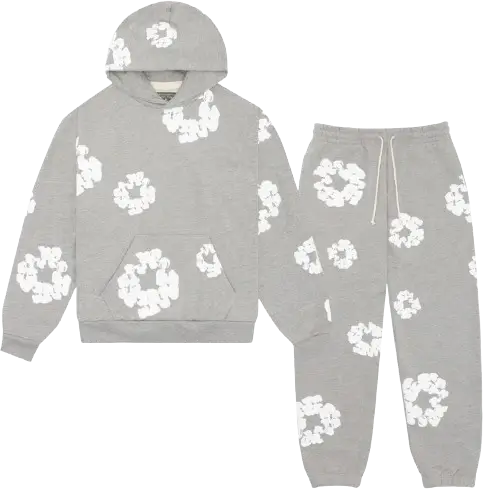Introduction
Denim Tears, founded by designer Tremaine Emory in 2019, has rapidly emerged as a noteworthy player in the fashion industry. Known for its bold designs and profound cultural commentary, the brand intertwines personal narratives with social consciousness, primarily focusing on the experiences of Black Americans and the broader African diaspora. This article will explore the brand’s history, its unique design philosophy, collaborations, cultural significance, and the challenges it faces in the contemporary fashion landscape.
The Origin of Denim Tears
Tremaine Emory, a New York-based designer and creative director, established Denim Tears as a personal exploration of his cultural heritage and identity. Emory’s journey began in the fashion industry, where he worked with brands like Stüssy and Supreme. His experiences in these environments influenced his understanding of streetwear and its intersection with high fashion.
Denim Tears’ inception was rooted in a desire to challenge the conventional notions of denim as merely a fabric for clothing. Emory sought to elevate denim into a medium for storytelling, reflecting both personal and collective experiences. The name “Denim Tears” itself signifies the emotional weight carried by the material, with “tears” representing the struggles, joys, and stories woven into the fabric of Black history.
Design Philosophy and Aesthetic
Denim Tears is characterized by its unique fusion of streetwear and high fashion, creating pieces that resonate with a diverse audience. The brand often features oversized silhouettes, bold graphics, and intricate embroidery, drawing inspiration from traditional craftsmanship and cultural motifs.
One of the defining features of Denim Tears is its use of denim as a canvas for storytelling. The fabric is adorned with powerful imagery and messages that reflect the struggles and triumphs of Black Americans. For example, Emory’s designs often include references to African American history, such as the iconic “Blood and Tears” denim jacket, which incorporates the symbolism of blood as a representation of sacrifice and resilience.
In addition to denim, the brand explores other materials and techniques, such as tie-dye and custom prints. Emory often collaborates with artists and craftsmen from the African diaspora to create limited-edition pieces that celebrate cultural heritage. This commitment to craftsmanship and authenticity sets Denim Tears apart in a market saturated with fast fashion and mass production.
Cultural Significance
Denim Tears is not just a clothing brand; it serves as a platform for cultural expression and activism. Emory uses his designs to address social issues, particularly those affecting the Black community. Through his work, he engages in conversations around identity, heritage, and the systemic challenges faced by marginalized groups.
One notable example of this cultural commentary is the brand’s collaboration with the iconic American retailer, Levi’s. In 2020, Denim Tears released a limited-edition collection that paid homage to the Black Lives Matter movement. The collection featured T-shirts and denim pieces emblazoned with powerful messages about racial justice, police brutality, and the need for systemic change. This collaboration not only showcased Emory’s commitment to social justice but also highlighted the role of fashion as a medium for activism.
Denim Tears also emphasizes the importance of representation in the fashion industry. Emory often features models of diverse backgrounds in his campaigns, challenging the narrow standards of beauty typically seen in mainstream fashion. By prioritizing inclusivity, Denim Tears sends a powerful message about the value of diversity in the industry.
Collaborations and Partnerships
Denim Tears Hoodie has gained recognition for its strategic collaborations with established brands and artists, which have helped amplify its message and expand its reach.
Collaboration with Levi’s
The collaboration with Levi’s is one of the most notable partnerships in the brand’s history. This partnership allowed Denim Tears to tap into Levi’s legacy as an iconic denim brand while infusing it with contemporary cultural relevance. The collection featured repurposed denim pieces adorned with Emory’s signature graphics and messaging, effectively blending classic Americana with modern social commentary.
Other Collaborations
In addition to Levi’s, Denim Tears has collaborated with various artists and brands, including the famous designer and street artist, KAWS. This partnership resulted in a capsule collection that combined KAWS’ distinctive artwork with Denim Tears’ aesthetic, creating a visually striking and culturally significant line of clothing. These collaborations not only enhance the brand’s visibility but also align it with other creatives committed to cultural dialogue and expression.
Celebrity Endorsements and Influence
Denim Tears has garnered attention from numerous celebrities and influencers, further solidifying its place in popular culture. Artists like Tyler, The Creator and A$AP Rocky have been spotted wearing the brand, helping to elevate its status within the fashion community.
Tyler, The Creator’s endorsement is particularly significant, as he has long been associated with breaking boundaries in fashion and music. His support for Denim Tears reflects a shared ethos of self-expression and cultural commentary. Similarly, A$AP Rocky’s influence in the fashion industry has drawn attention to Denim Tears, showcasing its appeal among the younger, style-conscious demographic.
The brand’s visibility on social media platforms, especially Instagram, has also contributed to its rapid growth. By engaging directly with its audience and leveraging user-generated content, Denim Tears has cultivated a community of loyal fans who resonate with its mission and aesthetic.
Sustainability and Ethical Practices
In an era where sustainability has become a crucial concern in the fashion industry, Denim Tears is committed to ethical practices and environmental consciousness. Emory emphasizes the importance of craftsmanship and quality, prioritizing sustainable production methods that minimize waste and reduce the brand’s carbon footprint.
Denim Tears often employs techniques such as upcycling and repurposing, which not only reflect the brand’s commitment to sustainability but also align with the cultural significance of the pieces. By using denim that carries history and stories, Emory creates a sense of nostalgia and connection to the past, reminding consumers of the importance of mindful consumption.
The brand’s dedication to ethical practices is further exemplified through its collaborations with artisans from the African diaspora. By supporting local craftsmen and women, Denim Tears contributes to the preservation of traditional skills and promotes economic empowerment within marginalized communities.
Challenges and Criticisms
While Denim Tears has enjoyed significant success, it faces challenges inherent in the fashion industry. The landscape is saturated with brands vying for attention, making it difficult for newcomers to maintain their identity and message. Additionally, as the brand gains popularity, there is the risk of losing its authenticity and connection to its roots.
Critics have also pointed out the potential for commercialism to overshadow the brand’s initial message. As Denim Tears collaborates with larger brands and celebrities, there are concerns about whether the focus on social issues may dilute in favor of profit. Emory has addressed these concerns by reaffirming his commitment to using fashion as a platform for cultural expression, emphasizing that profit should not come at the expense of the brand’s values.
Moreover, the ever-evolving nature of fashion trends poses a challenge for Denim Tears. As consumer preferences shift, maintaining relevance while staying true to the brand’s core message can be a delicate balance.
The Future of Denim Tears
Looking ahead, Denim Tears is poised for continued growth and impact in the fashion industry. Emory’s vision for the brand extends beyond clothing; he aims to create a cultural movement that resonates with a global audience.
As discussions around diversity, inclusion, and sustainability become increasingly relevant, Denim Tears is well-positioned to lead the charge in promoting meaningful change within the industry. Emory has expressed his desire to expand the brand’s offerings to include more lifestyle products, such as home goods and accessories, further embedding Denim Tears into the cultural fabric of everyday life.
Additionally, collaborations with other artists and brands will likely continue to play a crucial role in Denim Tears’ evolution. By aligning with like-minded creatives and organizations, Emory can amplify his message and reach new audiences, fostering a broader dialogue around the themes of identity, heritage, and social justice.
Conclusion
Denim Tears Tracksuit is more than just a clothing brand; it represents a cultural movement that weaves together fashion, identity, and activism. Through innovative designs, impactful collaborations, and a commitment to social justice, Tremaine Emory has carved a unique niche in the fashion industry. As the brand continues to grow and evolve, it remains dedicated to honoring its roots while pushing the boundaries of creativity and cultural expression. Denim Tears stands as a testament to the power of fashion as a medium for storytelling and social change, embodying the spirit of resilience and hope that defines the Black experience.


